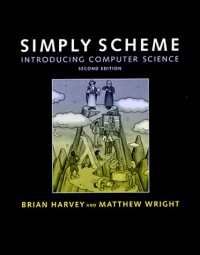
|
FreeComputerBooks.com
Links to Free Computer, Mathematics, Technical Books all over the World
|
|
- Title Simply Scheme: Introducing Computer Science, 2nd Edition
- Author(s) Brian Harvey, Matthew Wright
- Publisher: The MIT Press; 2nd edition (August 27, 1999)
- License(s): GNU General Public License
- Hardcover 611 pages
- eBook HTML and PDF Files
- Language: English
- ISBN-10: 0262082810
- ISBN-13: 978-0262082815
- Share This:

|
This book works hard to make the somewhat tricky ideas of Scheme accessible. This tutorial stresses small sections on key language features, from basic functions, variables, and onward to recursion and other functional programming concepts. While languages like C++ and Java use objects to model data, Scheme programmers break a problem down into functions. The art--and elegance--of problem solving in Scheme comes from applying recursion and other design concepts.
Should programming be a matter of learning where to put the semicolon and goto? According to Harvey and Wright, absolutely not. Programming, especially when you're starting off, is about the big picture, learning how to use your imagination and not your grammar. The authors use Scheme, a dialect of Lisp, as their base. Scheme and Lisp are symbolic programs that let you create programs that will write programs. Exercises throughout with Scheme help you get up to speed quickly and even have a good time. The first half of the book makes you comfortable with functions, leading you to projects involving bridge games and tic-tac-toe. In the second half, you deal with recursion, abstraction, files, and vectors. By the end of these chapters, you're ready to use Scheme to tackle databases and spreadsheets.
Simply Scheme proves that programming can be accessible as long as it stimulates, rather than deadens, the imagination. This book will give you a sense of the inner workings of computer applications like no other.
Though not often used in business, Scheme and its cousin Common Lisp (which the book describes in an appendix) are still favored by computer scientists, for example, in artificial intelligence research. Simple Scheme succeeds in making a difficult programming language both approachable and accessible. It's a valuable resource to any computer science student who is taking Scheme on for the first time.
About the Authors- Brian Harvey is Lecturer in the Computer Science Division, University of California, Berkeley. He is the author of Computer Science Logo Style (MIT Press 1997).
- Matthew Wright is a Musical Applications Programmer at the Center for New Music and Audio Technologies, University of California, Berkeley.
- Scheme Programming Language
- Introduction to Computer Science
- LISP Programming Language
- Functional Programming
- Artificial Intelligence, Machine Learning, and Logic Programming
- Computer and Programming Languages
 Similar Books:
Similar Books:
-
 Write Yourself a Scheme in 48 Hours (Jonathan Tang)
Write Yourself a Scheme in 48 Hours (Jonathan Tang)
A comprehensive first course in Scheme, covering all of its major features: abstraction, functional programming, data types, recursion, and semantic programming. By the time you finish, you should be fairly fluent in both Haskell and Scheme.
-
 The Scheme Programming Language, 4th Edition (R. Kent Dybvig)
The Scheme Programming Language, 4th Edition (R. Kent Dybvig)
This book provides an introduction to Scheme and a definitive reference for standard Scheme, presented in a clear and concise manner. It is witten for professionals and students with some prior programming experience.
-
 Functional Programming in Scheme (Kurt Normark)
Functional Programming in Scheme (Kurt Normark)
This is a book about functional programming in Scheme, which is a pragmatic choice of programming language in the functional programming paradigm, with unique flexibility due to the membership of the Lisp family of languages.
-
 Sketchy LISP: Introduction to Functional Programming in Scheme
Sketchy LISP: Introduction to Functional Programming in Scheme
This book is a step-by-step introduction to functional programming in Scheme. By means of numerous examples of varying complexity, it takes the reader on an entertaining and informative tour through the language.
-
 Concrete Abstractions: Computer Science using Scheme
Concrete Abstractions: Computer Science using Scheme
This book covers the basics of programming and data structures, and gives first-time computer science students the opportunity to not only write programs, but to prove theorems and analyze algorithms as well.
-
 Purely Functional Data Structures (Chris Okasaki)
Purely Functional Data Structures (Chris Okasaki)
This book describes data structures from the point of view of functional languages, with examples, and presents design techniques that allow programmers to develop their own functional data structures. All source code is given in Standard ML and Haskell.
-
 Object-Oriented vs. Functional Programming (R. Warburton)
Object-Oriented vs. Functional Programming (R. Warburton)
This book discusses similarities between these programming paradigms and points out that both FP and OOP are actually moving closer toward one another. One prominent example is the use of lambda expressions in Java and other OOP languages.





